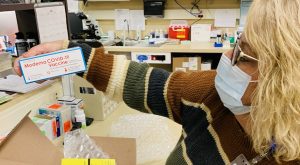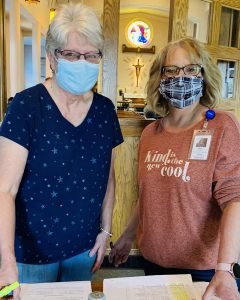The Guttenberg Municipal Hospital & Clinics’ Family Resource Center is proud to announce that Jim Solomon, SHIIP-SMP Counselor at the Family Resource Center, recently received a Governor’s Volunteer Award from Governor Kim Reynolds and Lt. Governor Adam Gregg during a special recognition ceremony held on Tuesday, June 6, in Cedar Falls. Solomon was honored with a 5 year service award by Senior Health Insurance Information Program (SHIIP) and Senior Medicare Patrol (SMP).
Jim began his training in the spring of 2018, and completed it later that summer. During his first open enrollment period in the fall, he spent 119 hours with 117 clients, helping them save a total of $46,114, an average of $394 per client. Over the past five years, Jim has provided meaningful assistance by sharing his knowledge and providing guidance to individuals, families and caregivers on how to navigate their Medicare and identify plans and resources that work for them. He has also spent countless hours in training.
“Iowans take great pride in their deep and rich commitment for serving others—it’s in our DNA,” Gov. Reynolds said. “Iowa nice is the foundation of our state–you see it everywhere you turn– Iowans volunteering their time to help others and improve their communities and our state. It truly is an honor to be able to recognize these individuals for their meaningful acts of generosity through the Governor’s Volunteer Awards and inspire others to do the same.”
Kari Harbaugh, Coordinator at the Family Resource Center, also shared her congratulations stating, “We are so fortunate to have Jim as a SHIIP volunteer, he goes above and beyond for the clients he serves!”
Kristen Griffith, SHIIP-SMP Director, shares “SHIIP-SMP Counselors are some of the best volunteers and people you could ever work with. They care deeply about their community members, and consistently go above and beyond to provide unbiased and trustworthy information helping individuals and their families navigate the complexity of Medicare.”
More than 500 awards are being presented this year during five ceremonies across Iowa. It is estimated that more than 150 communities in Iowa were served by this year’s honorees. Coordinated by Volunteer Iowa, the Governor’s Volunteer Award program—now in its 39th year—provides an easy way for Iowa nonprofits, charitable organizations, and government entities to honor their volunteers with a prestigious, state-level award. A complete list of award recipients and an electronic copy of this news release are available at volunteeriowa.org.
What is SHIIP? The Senior Health Insurance Information Program (SHIIP) is a free and objective Medicare health insurance counseling service of the State of Iowa Insurance Division sponsored locally by GMHC’s Family Resource Center. More than 350 trained and certified volunteer counselors assist thousands of Iowans annually, helping them save millions of dollars.
What is SMP? The Senior Medicare Patrol is a national program focused on empowering seniors to prevent and respond to health care fraud. SMP is administered by the Administration for Community Living (ACL). Our network of SHIIP -SMP counselors help individuals detect and report possible Medicare fraud, errors and abuse. The program also provides resources for consumers to protect themselves from healthcare scams.
If you would like to make a free appointment with our SHIIP Counselors, please call the Family Resource Center 563-252-3215.




